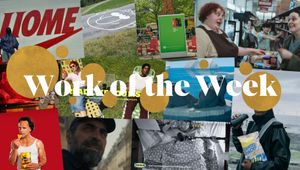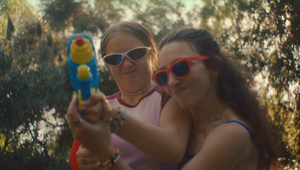
SMUGGLER's Andre Muir Reflects on Poignant and Timely Music Video for Vic Mensa

Andre Muir of SMUGGLER has directed his latest video 'Shelter' for Vic Mensa featuring Wyclef Jean and Chance the Rapper, portraying a deeply personal and poignant critique on the state of the world. Drawing from childhood memories and internal dialogue following his own personal tragedy, Andre explores the cycle of life, the black experience and the unbearable fear of being forgotten.
The music video is an homage to The Roots’ video 'You Got Me', similarly incorporating visual metaphors to drive the narrative and address the broken systems that have failed so many. As a black filmmaker, Andre grappled with his desire to tell truthful, emotional stories with often brutal imagery, while avoiding the all-too-often exploitation that emerges from black storytelling.
This video was deeply personal and stemmed from a tragedy in my life and in a way was my way with dealing with grief. I originally pitched a few different ideas to Vic Mensa, that he wasn’t really into. The ideas weren’t really there and I guess Vic could tell. We have known each other for more than a decade now, so I guess he could tell there was a level of distraction there and he had challenged me to make something based on what’s on my mind. My mother had just passed due to Covid-19 and we decided we would make something dedicated to her. I’m really thankful to him for allowing me to take his song and really make it something so much more personal.
At the same time, I didn’t know if it was the right time to make something so close to home, was I exploiting this tragedy? Or even, was it just too fresh? After sitting with it, and thinking about how powerless I felt through the entire ordeal, not being able to do anything, not being able to hold her hand, not being able to see her except through a Facetime or Zoom link, a camera in the corner of the room, and eventually it getting to the point where she was no longer strong enough to even do that. I couldn’t even bring her a bowl of soup if I wanted to. That feeling of powerlessness, I really hated it and I figured this was something I could do. It was something I could make or channel my energy into, to kind of cope with everything that was going on.

When coming up with the idea, I knew I wanted it to be a social commentary and a critique on what was going on around us, but I couldn’t exactly narrow what exactly we wanted to critique, who was to blame? Who were the bad guys, who’s our antagonist? Who’s at fault. We knew we didn’t want to blame the victims, blame their habits or blame their lifestyles? You can’t blame essential workers or the elderly? That’s when we kind of realised what was at the heart of this video. It was this idea: “Covid’s not the disease, it’s the symptom.” Of course, Covid-19 is a disease but it is doing exactly what a virus is designed to do. The people dying from Covid, the essential workers, the elderly, the people with bad health – they are dying because they are victims to the socio-economic system that failed them. Most of the victims of Covid are people with underlying health issues, health issues that couldn’t be addressed because they didn’t have access to healthcare. Or their essential workers that couldn’t stay home and safe during the pandemic. These are all victims of bad infrastructure. They're just victims of being forgotten, being insignificant. Covid-19, in a way, was just the straw that cracked the camel’s back.

Theme wise, the inspiration for the video came from this idea of being forgotten. Ignored or un-acknowledged. I have this sad feeling in my gut that all of the victims of the pandemic are going to be forgotten. The 450K victims at the time of writing this. It's common discourse to write off the victims of Covid as having been weak or sickly, in a way making them seem like they didn’t matter. Diatribes and statistics showing a less than 1% mortality rate, and in the grand scheme of things making the fatalities seem insignificant. Less than 1% may be true and these people may be insignificant to you, but to someone who’s lost a mother, a father, an aunt, grandparent, cousin, best friend – that loss is very significant. Right now, Covid just feels like a moment in time for everyone, but for me this is forever. I don’t want people to forget. I don’t want my mother to become invisible.

I pulled from a lot of references for this video. It’s a huge homage to The Roots video 'You Got Me' featuring Erykah Badu. In the video, you see Black Thought making his way through a city full of dead people and I always loved the twist ending when you realise everyone laying on the ground weren’t actually dead and that Black Thought himself was actually the one dead having died from a gun wound. I loved the social commentary behind the video as it related to gun violence and the post-apocalyptic world-building, and I thought this same kind of abstract visual was relevant for how we're feeling today. It really feels like the end of the world as we navigate this pandemic.
Throughout the video, we see buildings on fire. The idea here was that our world is on fire and crumbling around us, but no one seems to care or even realise it.
We open on four young girls playing Ring Around the Rosie in a Chicago courtyard. I chose this opener as a nod to another famous pandemic which was the black plague. I also pulled a lot of references from my own life. If you look at my short films, the majority of the mother figures (and there seems to be one in everything) – are always wearing scrubs, probably because my mother was a nurse. The little girls at the beginning of the video are dressed in schoolgirl uniforms as a direct homage to my favourite photo of my mother from when she was a little girl.

Working with Wyclef was a real highlight for me. It was really full circle for me as well. You have to realise that the first album I ever had, the first album my mother brought home for me and told me was mine was the Fugees album. Which is funny because it took some growing into before I was a real fan; I was too young to really understand the gravity of their work, but eventually, I did, and it became an album that we both shared. So then getting to meet the man in person and work with him on this video that I wanted to dedicate to my mother just felt so full circle. Just seeing him on the other side of a lens was just so surreal.
As a black filmmaker I’m happy there’s a real renaissance happening right now, where there is a focus on black work, black content, black art and I feel like it’s a long time coming. While at the same time, I’m happy there’s a new focus on black art, but I also have to be cognizant of the elephant walk we as black filmmakers have to walk. I want to tell true and emotional stories, but I don’t want to be some white man’s disaster / trauma porn.

There’s always that question you’re asking in the back of your head of what makes something good? And it seems like the majority of work that is lauded as great works of art from black creators always comes from a world of pain. I have a lot of that pain to draw from; I feel a lot of us (black filmmakers) have that, but it’s like at what point am I taking it too far? Am I taking it too far when I make a music video with nooses around the neck of black men hanging from street poles? Am I taking it too far with black bodies scattered all over the streets of the Southside of Chicago, am I exploiting the blackbody for views? Is my perspective poignant enough to cut through the possible exploitation of the blackbody? I would like to think in this case that the message outweighs the brutality of the image, but it’s always a gamble.

In the video, we see each of the bodies lying around the city transform into mounds of flowers. This was directly inspired by what I saw at my mother’s funeral, but also I wanted the video to end on a positive note. This kind of cycle of life. I think the most important moment of the video is the falling sequence and the transformation scene, where we see our Mother's character becoming engulfed by plants and flowers. With the falling sequence, I wanted to show essential workers and loved ones of our characters in the video falling victim to the unnamed disease in the video. The transformation scene is this surreal, otherworldly moment where flowers and plants engulf our Mother character. It’s supposed to be the culmination of the video and completion of the life cycle shown throughout.
- Andre Muir, director, SMUGGLER















